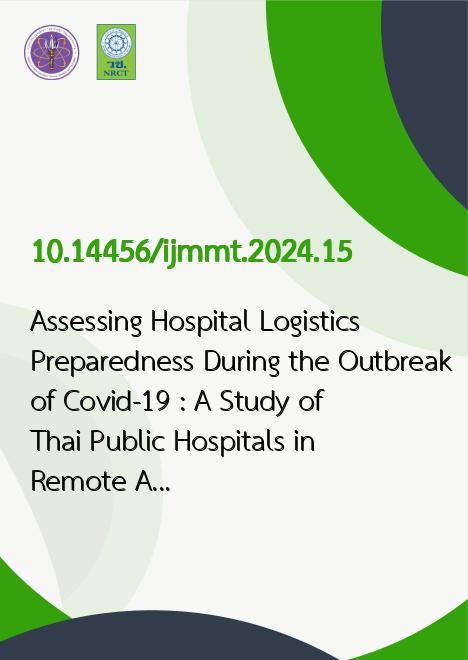
|
Assessing Hospital Logistics Preparedness During the Outbreak of Covid-19 : A Study of Thai Public Hospitals in Remote Areas |
|---|---|
| รหัสดีโอไอ | |
| Creator | Narat Hasachoo |
| Title | Assessing Hospital Logistics Preparedness During the Outbreak of Covid-19 : A Study of Thai Public Hospitals in Remote Areas |
| Contributor | Pornwasin Sirisawat, Tipavinee Suwanwong Rodbundith, Nattaphon Rangsaritvorakarn |
| Publisher | Banndamnoen Press |
| Publication Year | 2567 |
| Journal Title | International Journal of Multidisciplinary in Management and Tourism |
| Journal Vol. | 8 |
| Journal No. | 2 |
| Page no. | 199-212 |
| Keyword | Hospital logistics, Public hospital, Management, Covid pandemic, Remote area |
| URL Website | https://so03.tci-thaijo.org/index.php/ijmmt |
| Website title | https://so03.tci-thaijo.org/index.php/ijmmt |
| ISSN | 2730-3306 |
| Abstract | The hospital logistics operation is not about transportation; it's an entire operation that efficiently links two primary hospital operations, clinical and non-clinical services, aiming at the highest patient safety with a minimum total cost. The system is more complicated than it might seem, especially for Thai public hospitals in remote areas because of its location constraint. This paper aimed to assess the internal hospital logistics preparedness of 15 Thai public hospitals in remote locations of border cities in Thailand by using the World Health Organization's hospital readiness checklist for the COVID-19 guidebook. In-depth interviews and onsite operation observations were conducted at the hospitals during the rapid rise of the Omicron variant in Thailand. The result found a low preparedness score in five out of eight dimensions, including logistics coordination, IT, inventory management, forecasting, purchasing, storage area, transportation, and essential support services. Details of how the hospital prepared in each dimension are also discussed. The major contribution of this paper is exploring the challenges of public hospital internal logistics operations when implementing the recommended action by WHO, which received less attention from researchers compared to the study of hospitals in urban areas. |